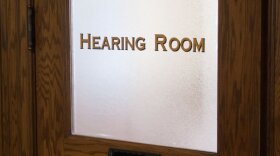Across Montana, 1,400 survivors of sexual assault haven’t had their rape kits processed. Since November, aspecial task force set up by Attorney General Tim Fox has been grappling with what to do with these kits.
For survivors, rape kits can contain crucial evidence for prosecuting assailants.
In Montana, the unsubmitted kits are sitting in law enforcement agency refrigerators, some since 1995. Law enforcement says the kits are unsubmitted for a number of reasons, like when the DNA of an assailant is already known.
“So there’s a variety of other reasons, some of them good and some of them questionable. And hindsight’s always 20-20," says Jon Bennion, Deputy Attorney General and member of the task force responsible for recommending how Montana can deal with unsubmitted kits now and in the future.
“I still think that there is a usefulness in testing all of those kits, and I think that’s what the task force has come to, the conclusion," Bennion said. "But going forward, and what we’re going to be discussing at our next meeting, is how is it that we give recommendations to local law enforcement on submission of kits in the future so that we don’t leave any stone unturned.”
Testing 1,400 kits won’t come cheap. Bennion says the task force is considering several strategies for funding.
“Asking for funding from state resources, going to the legislature and passing bills, or getting funding to address the problem here in Montana,” he said.
With or without state funding, the idea of testing all kits is complicated.
Robin Turner is the public policy and legal director at Montana Coalition Against Domestic and Sexual Violence in Missoula and member of the task force. She says sexual assault victims have needs beyond just having their evidence processed.
((CORRECTION: A previous draft of this story mis-identified Turner's role at MCADSV as a victim advocate))
“Obviously testing kits is important because it helps us identify public safety risks and helps bring some closure to these 1,400 survivors," Turner said, "but I can see an investment in our communities that makes the criminal justice response more humane to survivors.”
Turner says there may be survivors who don’t want their kits tested after all of these years. Because of this, victim communication must be done by people who understand trauma.
“Do we understand what trauma has done to this survivor? Are we making sure that they do have choices?" Turner asks. "Are we explaining clearly the choices that we get to make, and what our roles are, and why we might have made the choices we made.”
Both Turner and the Attorney General’s office say victims often need help to feel comfortable and safe as they report, and consider providing evidence and prosecution.
Turner says these changes need to happen inside and outside of law enforcement agencies. Many survivors decide to not press charges or go forward with the criminal justice process.
“I think that when we talk about, ‘Well, the victim decided not to participate any further,’ I think there has to be more of a conversation around that," Turner said. "Why? What was the reason that the person decided not to participate. It could be a myriad of reasons. That response was the most concerning to me, just because… I would like more information.”
In May, the task force applied for a $2 million grant from the federal Bureau of Justice Assistance. The money would partially go to testing unsubmitted kits, but also to survivor support and outreach.
For Turner, adequate support for survivors requires much more than $2 million. She says that only 2.5 out of every 100 survivors will see their cases result in a conviction.
“That just shows me that the issues we’re addressing are outside of just our criminal justice response,” she said.
Turner has a number of ideas for what survivor support should look like in Montana,
“Oh well, a dream scenario," she says - "Let’s just pretend that there isn’t just $2 million. Let’s pretend we have more money. Can we use that funding to make sure we’re supporting survivors of sexual assault, whether that be through, obviously, the therapeutic pieces that are needed, but also through helping them sustain housing, through helping them sustain their work, their employment. Helping make sure they have accommodations to heal from the assault, or to participate in the criminal justice process when it takes them away from their work and their families.”
The task force won’t know until September whether or not they will get the grant. Turner and Jon Bennion from the Montana Attorney General’s office say that important work will still be done even if they don’t get the grant.
“It will be disappointing, and yet, that will just be the start of a new path that we’ll have to take, where we perhaps are going to deal with this more on a state legislature basis," Bennion said.
The legislature’s Law and Justice Interim Committee is backing the grant application process. It’s been conducting its own study on sexual assault with the intent of proposing new legislation next year.
Bennion says collaboration with the Interim Committee is helpful to everyone involved.
“We’ve been involved, we will continue to stay involved, and I think that collaborative process has been educational for not only legislators, but everyone involved in the prosecution and investigation of sex assault crimes," he said.
The Sexual Assault Evidence Task Force will have its third meeting on Fridayat the State Crime Lab in Missoula.





